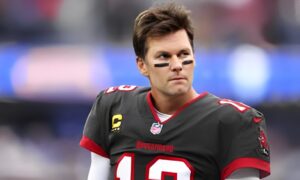Tom Brady, who has etched his name in NFL history as one of the greatest players of all time, is at a potential crossroads in his legacy, not from his feats on the field, but from an issue that is getting more and more attention: the health of the players, especially in relation to concussions. Tua Tagovailoa, the Miami Dolphins’ promising young quarterback, recently underwent a series of concussion-related injuries, raising concerns about the long-term safety of NFL players and the future of the sport.
Here's ads banner inside a post
Tua Tagovailoa’s injury problem and impact on the NFL
Tua Tagovailoa has drawn public attention when he suffered concussions in recent seasons, sparking a wave of concern about whether the NFL is truly protecting player health. Tagovailoa’s injury is not just an individual situation, but a dramatic reminder of the potential dangers that players face every week. Scientific studies have shown that repeated concussions can lead to serious consequences, including chronic encephalopathy (CTE) – a condition that has been detected in many former NFL players after their deaths.
Tua Tagovailoa has become a symbol of these risks, and his story has spurred discussion about whether the NFL is doing enough to protect the health of players, especially young players. While the NFL has introduced many new rules and improved concussion testing procedures, Tagovailoa’s injury suggests that there may still be gaps in player safety. So what does this mean for Tom Brady and his legacy?

Here's ads banner inside a post
Tom Brady’s legacy in the face of player health concerns
Tom Brady, after a career spanning more than two decades, has won seven Super Bowl titles and is considered the most successful career in NFL history. He was famous for his ability to maintain good health and compete at the peak of his form until his retirement at the age of 45, an incredible feat in a sport as extreme as American football. Brady has faced many strong collisions on the pitch, but he rarely has to leave the field because of serious injuries, especially concussions related to the brain.
However, the health problems of players in today’s NFL may cause fans to question how Brady and other players have dealt with these dangers throughout their careers. Some may argue that Brady was “lucky” to escape the serious consequences of the injuries, but does this diminish his responsibility to push for change in player safety?
Brady, as an NFL icon, will likely face pressure to express his views on issues related to player health, especially after Tagovailoa’s injury. What Brady says or does next could affect how people perceive him, not only as someone who has dominated the field but also as someone responsible for shaping the future of the NFL.
Here's ads banner inside a post
The debate over player safety and the future of the NFL
The NFL, in recent years, has begun to recognize the importance of protecting the health of its players, especially those associated with concussions. They have taken many measures to minimize injuries, from improving protective equipment to adopting stricter rules for handling injuries on the field. However, Tua Tagovailoa’s injury has shown that there are still many issues that need to be addressed.
The main problem facing the NFL is how to balance the competitiveness and excitement of the sport while ensuring the safety of its players. American football is inherently a high-impact sport, and any change in the rules to protect players can reduce the appeal of the game. This raises an important question: can the NFL survive and thrive without sacrificing the health of its players?
Tom Brady, with his influence, could play an important role in this debate. His legacy is not only about the trophies he won, but also about how he contributed to protecting the future of the sport to which he devoted his entire career.

How will Brady face the challenge?
For Tom Brady, it’s not just about what he’s done on the pitch, it’s also about what he’s going to do after he retires. Brady has set out to build a strong personal brand, from business ventures to social activities. However, given Tua Tagovailoa’s concussion and growing concerns about the player’s health, Brady may have to consider how he uses his voice and influence to help solve this problem.
Brady may choose to be an advocate for raising awareness of player health, promoting safer measures, and calling on the NFL to invest more in medical research to protect players. If he does this, his legacy will not only stop at his achievements on the pitch but also spread to another, equally important aspect: protecting future generations of players.
Conversely, if Brady chooses to stay out of this debate, fans will likely begin to reconsider his role in shaping the sport. While his achievements on the pitch are undeniable, his silence on such an important issue will likely affect how people perceive his dedication to the sport he has come to love.

